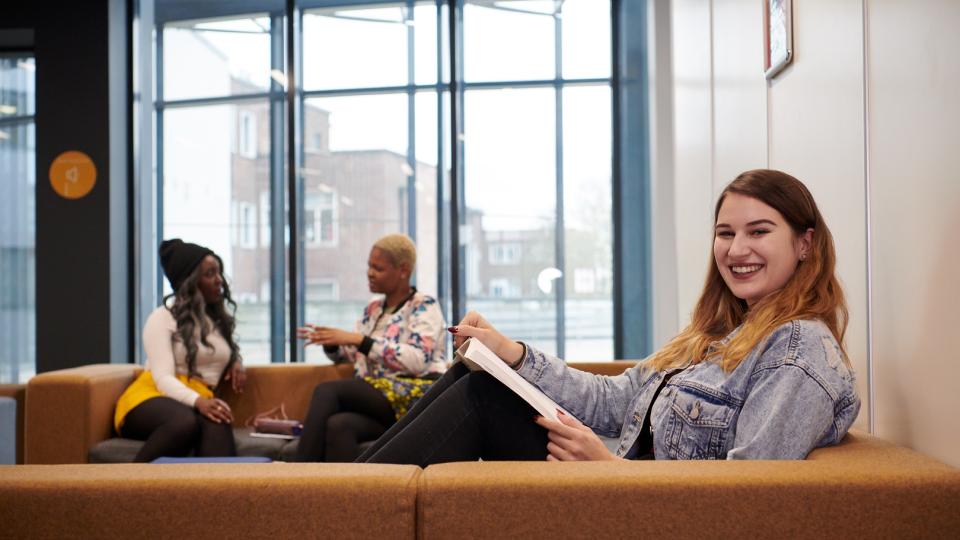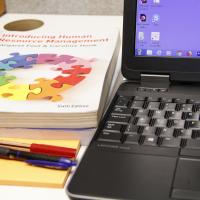
London College of Music subject guide
Welcome video
Welcome to the subject guide for the London College of Music.
Your subject librarians:
- James Concannon - Music Performance, Acting and Musical Theatre and related courses (email: james.concannon@uwl.ac.uk)
- Dr Janice Fernandes - Music Production, Acting and Musical Theatre and related courses (email: Janice.fernandes@uwl.ac.uk)
You can also search for us on MS Teams by our names. Contact us via email to ask questions about your assignments and further reading. Follow-up appointments can be in person or via MS Teams.
Our roles are to support you throughout your course by providing the resources you need for your studies and to help you develop information literacy skills. Below are links to a range of specialist resources and some practice exercises to make sure you are developing your knowledge and skills.
What the Library can offer you
We have a wide range of material to support you both within the Paul Hamlyn Library and via the Digital Library.
Log in to the digital resources with your student details (student ID number, your username and personal password). If you are having trouble with your password, you can contact the IT department by visiting our IT Support page. Or, visit our setting your password page so you can register to reset your password yourself.
Where do I begin? Reading lists, ebooks and Libsearch
Begin with looking at your module’s reading list. View our "using reading lists and ebooks" tutorial.
Each module has a reading list that gives access to the books, journal articles and webpages that your teachers would like you to read.
Reading lists can be found in each module’s Blackboard space but you can also search for your reading lists online, either by module name or module code.
Many reading lists recommend a wide selection of ebooks. You can click on the ‘View Online’ option to open the ebook. Perlego is another large collection of ebooks that you can access.
Some recommended books are only available in print form; see below for more information about printed books, including how to locate them in the library.
-
LibSearch
Once you’ve looked at your reading list, you can find more resources relevant to your course of study using Libsearch, the library’s general search engine.
This provides access to a wider range of sources (academic journal articles, magazines, trade publications, videos, theses, reports, etc) to allow you to begin exploring your assignment topics in more detail. Based on simple but well-structured searches, you can find and access relevant e-books; you can identify appropriate printed books and see where they are located in the library; you can also access journal articles, databases and a range of other useful documentation.
-
Printed books
To identify and locate books on your topic, begin with your module’s reading list and then expand your reading using LibSearch.
You will find that some titles are available as print copies only, some as ebooks only and some in both formats. LibSearch and your reading list will indicate the location of a printed book by giving its ‘shelfmark’, eg 780.68 HAR or 792.01 FOU. Find out how you can use the shelfmark to find books on the library shelves via our library resources and e-resources page.
You will find music scores on the first floor in the mobile shelves.
Most printed books on music, as well as theatre topics, can be found on the 3rd floor of the Paul Hamlyn Library under the class numbers below.
Music
- 780 Music
- 780.6 Music management
- 780.7 Music education
- 780.72 Musicology
- 780.92 Musicians, composers
- 781.63 Popular music
- 784 Instruments and instrumental ensembles
- 621 Audio production
- 780.26 Music scores (1st floor, mobile shelves)
Drama
- 782.14 Musical theatre
- 791.4 Acting and performance
- 792 Theatre
- 822 English drama
- 001.4 Research methods (1st floor)
- 808.06 Academic writing
The print books can be borrowed for one week but will automatically renew each week for the length of your course unless someone else requests them.
Ask the Customer Experience team (on the library floors or the Library Help Desk on the ground floor) if you need help in finding your books.
Journals and databases
Journals are weekly, monthly or quarterly publications that publish articles on specific topics, often describing research the authors have done. Journals can be in print form and also online. Print journals are located on the second floor of the library along with the Study Skills collection. Ask the Customer Experience team (on the library floors or at the Library Help Desk on the ground floor) if you need help in finding print journals.
- 19th Century Music at JSTOR
- BPI market reports
- British Journal of Music Education at Cambridge University Press
- Computer Music Journal at IEEE Xplore
- The Musical Times at JSTOR
- Searching e-journals at EBSCO
- Sound on Sound
- Theatre Journal at JSTOR
Databases are collections of a large number of journals. They contain scholarly and peer-reviewed articles which you can use for your assignment, literature review, dissertation or to gather more information on a topic.
Please note, you will need to log in with your student username and password for some of the links below:
-
Databases for Music students
This resource contains bibliographies as well as full-text journal articles and has over two million records. It provides access to more than 660 periodicals in the Music and Performing Arts collection.
JSTOR Arts & Sciences Collections
This collection provides access to the full text of an extensive range of articles mainly from arts and humanities academic journals. There are currently 72 Music Titles and 25 journals for Performing Arts. It also has a large collection of e-books. For more instructions on how to search inside JSTOR, please see the support pages.
This is an online collection of recorded music in streaming audio, including classical as well as world music, jazz and complete catalogues or selected recordings of over 940 labels. It includes biographies, dictionaries and aural training exercises as well as a musicology section.
-
Databases for Drama students
This resource contains bibliographies as well as full-text journal articles and has over two million records. It provides access to more than 660 periodicals in the Music and Performing Arts collection.
BoB (Box of Broadcasts) is a shared online off-air TV and radio recording service for UK higher and further education institutions. Staff and students can record programmes and schedule recordings in advance, from over 65 free-to-air channels, including the BBC, ITV, Channel 4, Film4, Channel 5, CNN and Sky News, as well as having access to an extensive archive. The films or clips can be played in lectures and seminars, embedded in the VLE or viewed across various devices. The archive currently offers over 120,000 TV and radio programmes.
- New users should register their individual email addresses on first usage.
Alternative link: Drama Online
This database combines exclusively available playtext content and scholarly publications with filmed live performances, film adaptations and audio plays.
JSTOR Arts & Sciences Collections
This collection provides access to the full text of an extensive range of articles mainly from arts and humanities academic journals. There are currently 72 Music Titles and 25 journals for Performing Arts. It also has a large collection of ebooks. For more instructions on how to search inside JSTOR, please see visit the JSTOR website.
Kanopy is a video streaming service that offers more than 30,000 films. A wide range of subjects are covered with strong collections in arts and music. You can browse the collection by subject.
The National Theatre Collection draws on 10 years of NT Live broadcasts, alongside high-quality archive recordings never previously seen outside of the NT’s Archive.
Using the Referencing Management Tool ‘RefWorks’
Store and properly format the references you find in databases.
Other sources of information
In addition to the resources you can find via our library, there are other additional sources relevant to your topics. Have a browse of this list to discover more information.
-
Useful websites
British Library Music Collections - The British Library has a world-famous collection of printed and manuscript music, music recordings, concert programmes, books and periodicals on music.
Choral wiki - Here you will find free choral and solo vocal scores, texts, translations and other useful information available for free download.
Classical Net - The Classical Explorer is a place to discover works by lesser-known composers and lesser-known works by well-known composers. A basic repertoire of recordings, reviews, articles and links to other classical music sites.
International Music Score Library Project (IMSLP) - This is a project for the creation of a virtual library of public domain music scores based on the wiki principle and contains public domain recordings and scores.
Musicalics - The Classical composers Database - Here you can find information about more than 26,000 composers and over 700,000 compositions.
Mutopiaproject - Links to sheet music editions of classical music for free download.
Operabase - Reviews and guides to performances, guide to composers and works and other opera resources.
Philharmonia Orchestra - Useful videos on a variety of instruments.
World Music Archive - Recordings from the BBC World Music archive, capturing the life and musical traditions of countries ranging from Brazil to North Korea and Cuba to Turkmenistan.
-
Useful books for your research and dissertations
Practice-led Research, Research-led Practice in the Creative Arts, Hazel Smith and Roger T Dean (editors).
Succeeding With Your Master's Dissertation: a Step-by-Step Handbook, John Biggam.
The Dissertation From Beginning to End, Peter Lyons and Howard J Doueck.
Creative Research: the Theory and Practice of Research for the Creative Industries, Hilary Collins.
Research Methods in Theatre and Performance, Baz Kershaw and Helen Nicholson (editors).
Finding resources for dissertations and systematic reviews
Below are a range of resources and skills tutorials for those who are undertaking a substantial piece of work such as a dissertation, thesis or systematic review, in which detailed and comprehensive searching of the research and professional literature is required.
-
Theses and dissertations
British Library theses (formerly EThOS)
The main British Library catalogue now provides access to digital doctoral theses held in UK institutional repositories. To access these documents, search for a thesis and then click on a title of interest to view the full details for that work. TOnhe link can be found under the section labelled "View line - External Resource Available" (in green) just above the "I want this" section (in red) at the bottom of the page.
If the dissertation you require is not open access, please request an inter-library loan.
Using the Referencing Management Tool ‘RefWorks’
Store and properly format the references you find in databases.
Citation and referencing
When writing assignments, you need to acknowledge your use of another author's ideas so that you:
-
Give the original author credit
-
Support your arguments
-
Enable the reader to find your sources
-
Prove to your lecturer that you have read around the subject
-
Avoid accusations of plagiarism
Accurate referencing will help you avoid accusations of plagiarism and possible loss of marks. Plagiarism is presenting someone else’s work or ideas as your own by incorporating it into your work without full acknowledgement.
There are two video tutorials on how to cite (in the text) and reference your sources correctly.
- View our Harvard Referencing (citing your sources in your work) video
- View our Harvard Referencing (creating your reference list) video
Watch them carefully and contact me with any follow-up questions you might have.
Practice exercises
Below are some exercises to help you to get familiar with searching for information using the Library resources.
-
LibSearch
As you know, LibSearch is available from the Library homepage and allows you to search for information on your keywords that has been published in journals, books, reports, etc. It is important to be confident in using the "All filters" section to enable you to narrow down the results to the most useful ones to read.
Exercise:
Use the below steps to search LibSearch and answer the questions below:
- Search for "classical music and academic performance"
- Use the filters menu to narrow down to:
- Date range: Past 10 years
- Source: academic journals
Questions:
Who wrote the article "Engaging Multitasking Performance Ensembles Through World Music Pedagogies"?
What year was it published?
What journal was it published in?
-
Ebooks
Ebooks are accessible via LibSearch.
The best way to find them is to:
- Search for keywords that describe your topic, for example: "stop and search"
- Within the "All Filters" option, narrow down to:
- ebook
- Full text online
- Limit your search by date (last 12 months, last 3 years) to find only the most recently published books
When you have found a book to read, you have the option to read online. Be sure to sign out of the book once you have finished looking at it.
Exercise:
Find the ebook Scholarly Research in Music: Shared and Disciplinary-Specific Practices by Sang-Hie Lee.
Questions:
How many pages can you copy of the book? (Hint: this information is on the page before you "read online")
Does this book mention ethnomusicology? (Hint: use the "search within book" search box)
-
Journals
Journals are incredibly rich in content and you will find them useful for your course throughout your studies. Journals are weekly, monthly or quarterly publications that publish articles on specific topics, often describing research the authors have done. The library subscribes to thousands of journals, so it is important to be able to find the relevant ones for you. You can search in LibSearch or specialist databases for articles on topics. If you are looking for a specific journal, you can search LibSearch by entering its title.
Exercise:
Use the below steps for journals and answer the questions below:
Enter in LibSearch the title of the journal you are looking for, for example "British Journal of Music Education".
Look at the date range that is available for the journal.
Questions:
What is the oldest year that is available for "British Journal of Music Education"?
Open the journal and browse to 2020. How many issues were published that year?







